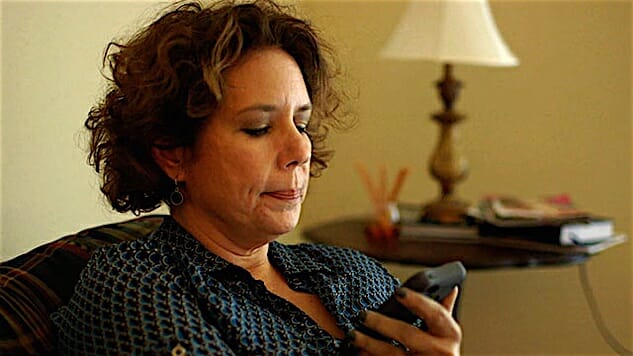
During a South Carolina campaign rally in 2015, Donald Trump mocked Serge Kovaleski, an investigative reporter with arthrogryposis. The insult was as uncalled for as it was approved of by his audience, who cheered the man who would be president’s casual reinforcement of accepted stereotypes about the disabled: They’re flailing, incompetent, helpless and unable to control their own actions.
Trump plays no part in Rachel Dretzin’s Far from the Tree, a documentary distilled from Andrew Solomon’s nonfiction novel of the same name, but the film rebukes his cruelty regardless by doing what cinema does so well: highlighting humanity. Solomon, serving as the film’s narrator, a bridge between each of his subjects and a subject in his own right, wrote his book in 2012 as a way of forgiving his family, specifically his late mother, for rejecting him on account of sexual orientation. Being gay, according to his mom, meant he’d never live a normal life. Like several women we meet in the film, she assumes responsibility for her son’s “affliction,” opining, by Solomon’s recollection, that he turned out gay because she invited gay couples into her home.
Another filmmaker would wrap a film about homophobia around this anecdote. Dretzin takes two keywords, “normal” and “different,” and makes a film about people who stand apart from their families in various ways—physical, mental or in extreme cases, moral. In 2010, Louisiana teen Trevor Reese fatally slashed eight-year-old Jackson Attuso’s throat. In Far from the Tree, Dretzin sits with his parents, Derek and Lisa, and his siblings, Tyler and Rebecca, who speak to Trevor over the phone as he lives out his life sentence in prison, observing their refusal to surrender to the unknowable: Why did Trevor kill Jackson? No one knows, not even Trevor, but the Reeses see a profound link between their alienation from their son and Solomon’s other subjects, regardless of blatant surface discrepancies separating them.
There’s Jason Kingsley, a man with Down syndrome, a sense of kinship with Frozen’s Princess Elsa, and difficulties distinguishing that film as fiction; Jack Allnutt, who speaks to Dretzin through his communication board and compares living with autism to being a caged tiger; and three “little people,” starting with Loini Vivao, who we follow as she attends the Little People of America conference, and continuing with married couple Leah Smith and Joe Stramondo during Leah’s pregnancy. Far from the Tree isn’t about Dretzin making a point or serving as an advocate. It’s about ceding space to disabled voices and letting them tell their stories in their words.
Together they weave an empathetic mosaic. After a time we stop seeing them strictly as disabled. Trump’s attack on Kovaleski reduced him to a diagnosis. Far from the Tree doesn’t divorce these people from their own diagnoses, but argues that autism, Down syndrome, homosexuality and achondroplasia create the bases for new identities. The innate challenges of lives lived under the banner of those identities are not glossed over or presented in treacly language; dwarfism puts obstacles in Vivao, Smith and Stramonodo’s paths, as autism does for Allnutt. But these obstacles aren’t really obstacles at all, just realities that Dretzin and Solomon’s subjects have learned to embrace. They thrive. They uplift the heart, too, especially toward the end, when Smith and Stramondo surprise his average-sized folks with an ultrasound shot of their child in utero. The scene ends with everyone in tears. Feel free to join in their joy.
Smith’s perspective on parenthood is enlightening. She would prefer a “little person,” but if her child turns out average sized, she’ll understand them, because she understands what it’s like to be different from everyone else in your family. The sentiment feels like a divine revelation, and upends the meaning we invest in the word. It’s essential, the film argues, to see and accept that which makes us all different from each other, but to be different isn’t to be lesser, and it certainly doesn’t make us inscrutable from people unlike us. But the act of acceptance is an active, ongoing process. When we see Allnutt “talk” with his parents for the first time, the clouds hanging over their lives open up. “My god,” his mother, Amy, says to the camera, “he’s in there.” When we listen in on the Reese’s conversations with Trevor, we grasp that their relationship will never be the same from one day to the next. It’s ever evolving. Tyler and Rebecca have sworn off having kids, a direct response to Trevor’s crime. But will that remain true? Will they grow closer to Trevor over years, and in growing closer forgive him as Solomon forgave his mother?
Far From the Tree joins Three Identical Strangers and Won’t You Be My Neighbor?, each appropriately different from one another, in an accidental trilogy about nature, nurture and loving people for who they are and not who we want them to be. In 2018, that message carries excess weight it might not otherwise, but in any year, at any time, the film’s lessons are invaluable: We’re all different, and yet being different makes us all the same.
Director: Rachel Dretzin
Writer: Andrew Solomon (novel)
Starring: Andrew Solomon, Leah Smith, Joe Stramondo, Jason Kingsley, Jack Allnutt, Derek Reese, Lisa Reese, Loini Vivao
Release Date: August 3, 2018
Boston-based culture writer Andy Crump has been writing about film and television online since 2009 (and music since 2018). You can follow him on Twitter and find his collected writing at his personal blog. He is composed of roughly 65% craft beer.